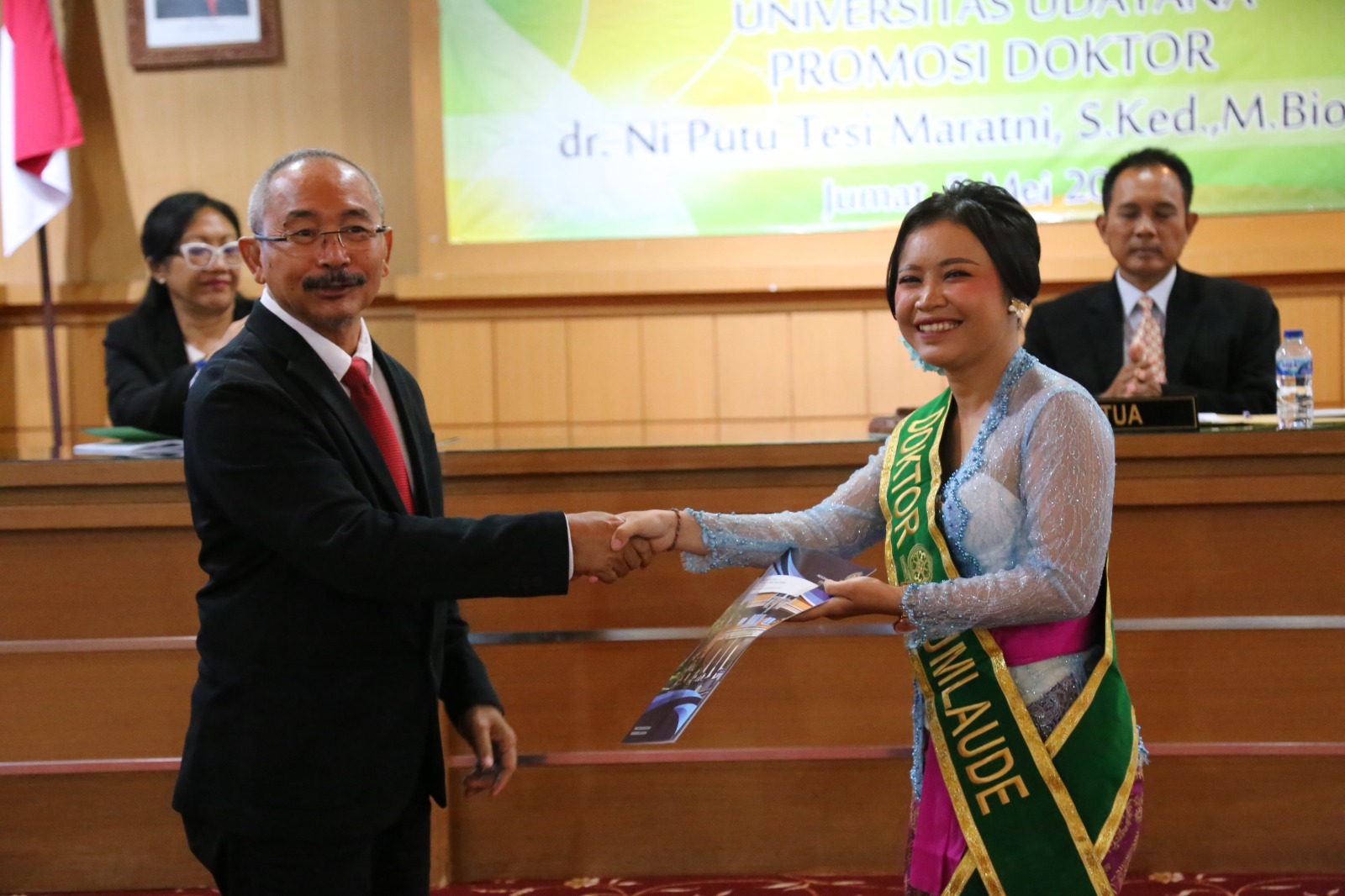New Marker For Prediction of Cardiovascular Complications in Diabetes Patients, Leads Tesi Martini to Earn a Doctorate Degree
New Marker For Prediction of Cardiovascular Complications in Diabetes Patients, Leads Tesi Martini to Earn a Doctorate Degree
Located in the Postgraduate Meeting Room Lt III, Denpasar Postgraduate Building, a Doctoral Promotion examination was held with promovenda candidate dr. Ni Putu Tesi Maratni, S.Ked., M.Biomed., with the dissertation title "Low Apolipoprotein E Levels Correlated with Decreased Netrin-1 Levels But Not with mIRNA146a and Nf-κβ and Is a Risk Factor for Complications of Coronary Heart Disease in Type Diabetes Mellitus 2". (5/5/2023)
Identification of new markers that are ideal and predictive of the development of cardiovascular complications in patients with type 2 diabetes mellitus (DMT2) can be useful in the process of stratifying patients to monitor patient response during intervention and management. Biological molecules such as apolipoprotein E, netrin-1 and miRNA146a are thought to play a role in the inflammatory process associated with NF-κB.
This study aims to determine the correlation between levels of apolipoprotein E, netrin-1, miRNA146a and NF-κB and the relationship between levels of these potential biomarkers and the risk of complications of coronary heart disease (CHD) in T2DM patients at Prof. Hospital. Dr. IGNG Ngoerah, Denpasar.
In this study, a total of 114 participants were divided into two groups: 57 diabetic patients with CHD and 57 diabetic patients without CHD. Examination of apolipoprotein E, netrin-1 and NF-κB using enzyme-linked immunosorbent assay (ELISA). The relative expression of miRNA146a was determined using reverse transcription quantitative real-time PCR (RT-qPCR).
The relationship between the level of this biomarker and the incidence of CHD complications was analyzed using bivariate and multivariate logistic regression analysis.
Apolipoprotein E, netrin-1, miRNA146a levels were not found to correlate with NF-κB levels. Only apolipoprotein E and netrin-1 levels were found to have a strong positive correlation. Low levels of apolipoprotein E and low netrin-1 in T2DM patients were found to significantly increase the risk of developing CHD complications by 7.87 and 2.94 times, respectively. Low levels of miRNA146a were not found to increase the risk of CHD complications. T2DM patients who have low levels of apolipoprotein E, but without the use of statin therapy have a probability of 86.4% to experience CHD complications, while those who receive statin therapy have a lower probability of 32.6%.
Low levels of apolipoprotein E and netrin-1 are risk factors for CHD complications in T2DM. Examination of these two biomarkers can be proposed as a routine examination in T2DM patients to monitor the progress of CHD complications so that more intensive follow-up therapeutic strategies can be developed for high-risk patients.
The exam was led by the Deputy Dean for General Affairs and Finance of FK Unud, Dr. dr. I Made Sudarmaja, M.Kes., with a team of examiners:
1. Dr. dr. Ketut Suastika, Sp.PD-KEMD (Promoter)
2.Dr. dr. Made Ratna Saraswati, Sp.PD., KEMD., FINASIM (Co-promoter I)
3. drh. I Nyoman Mantik Astawa, Ph.D (Co-promoter II)
4. Dr. dr. I Wayan Wita, Sp.JP (K)
5. Prof. Dr. dr. I Made Jawi, M. Kes
6. Dr. dr. I Wayan Putu Sutirta Yasa, M.Si
7.Dr. dr. Wira Gotera, Sp. PD-KEMD-FINASIM
8.Dr. dr. Urged Made Wihandani, M.Kes
9.Dr. err. nat. dr. Ni Nyoman Ayu Dewi, M.Sc
10.Dr. dr. I Made Muliarta, S.Ked., M.Kes
While academic invitations are:
1.Dr. dr. Ni Made Linawati, M.Sc
2.Dr. dr. Luh Putu Ratna Sundari, S.Ked.,M.Biomed
3.Dr. dr. I Gusti Ayu Widianti, M. Biomed
4. dr. I Made Winarsa Ruma, S.Ked.,Ph.D
5.Dr. dr. I Made Pande Dwipayana, Sp. PD-KEMD, FINASIM
In this exam, Dr. dr. Ni Putu Tesi Maratni, S.Ked., M.Biomed was declared a graduate as the 376th Doctor Graduate of the Doctoral Study Program in Medical Sciences, Faculty of Medicine, Udayana University with the Cum Laude predicate.





